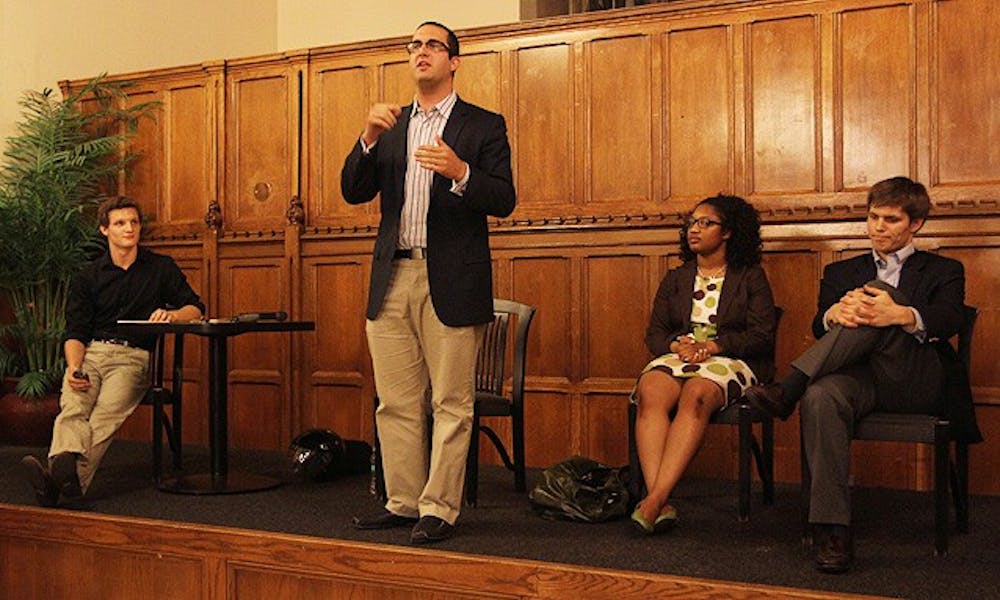The three candidates vying for the Duke Student Government presidency addressed students two days before the election.
Ashley Jordan, Central Campus representative on Campus Council; Isaac Mizrahi, an at-large DSG senator for residence life and dining; and DSG Executive Vice President Pete Schork, all juniors, presented their opinions and platforms to a group of more than 40 students in a pre-election debate Monday night. The debate, which took place in the Great Hall, was moderated by sophomore Cory Adkins, incoming chair of The Chronicle’s independent editorial board.
The debate consisted of two question-and-answer segments. During the first part, Adkins posed a single question to the three candidates, who each had two minutes to respond. The second segment began in the same manner, and the other two candidates then had one minute each to offer a rebuttal or commentary on the first candidate’s initial response. The questions touched on topics such as the West Union Building renovations, the house model and Duke’s global expansion into Kunshan, China, as well as the general management of DSG.
Although all candidates agreed that DSG needs to be a more effective representative of the student body, they differed in their policy priorities and approaches to various campus issues. The candidates focused on particular campus issues especially during the second segment, though they spent a significant amount of time discussing matters internal to DSG.
As the only candidate currently not part of DSG, Jordan said she has a better perspective on how to reform the organization.
“When Walmart decided that they wanted to beat Target, they got a person from Target,” she said. “If DSG wants to become a better organization, why not get someone from Campus Council?”
Jordan named the new house model as one of the most important issues facing Duke students. Creating a fair process to determine initial housing assignments will be one of her priorities, she said.
“This is a real point where the Duke student body could come together and figure out something because the administration does seem open to suggestions,” she said.
In response to an opening question, Mizrahi said he chose to run for DSG president to increase the group’s accountability to students. Mizrahi cited results from the recent DSG Survey Commission that showed that 76 percent of students polled did not believe that DSG represented students effectively—a number he said was “unacceptable.”
Mizrahi said he would bring a student voice to campus issues, such as the renovation of West Union. He wants to advocate for groups whose current meeting spaces, such as the Mary Lou Williams Center for Black Culture and the Center for Lesbian, Gay, Bisexual and Transgender Life, would be relocated.
“They are not moving around space—they are moving people’s homes,” Mizrahi said. “When you start to meddle with those things... you don’t really realize the lasting effects you have on people’s attitudes toward the administration.”
As a member of the DSG executive board, Schork believes he will be a strong advocate for students’ needs.
“The administrator’s default position... is not to accommodate us. It’s to not accommodate us at all,” he said. “It’s very important to have an active and passionate student advocate as your DSG president.”
In response to a question about the planned Duke campus in Kunshan, Schork said the expansion presents an important opportunity for the University to develop its brand internationally. He added that it should mirror changes to how global interests are handled in Durham.
“By establishing our brand abroad... we’re creating greater demand for international students to come to Duke,” Schork said. “I would advocate... to create a five-year strategic plan for international financial aid and create a committee within DSG for this purpose this year.”
Freshman Justin Leder, who attended the event, said the structure of the debate did not permit the candidates to speak extensively on each issue, but it helped that the candidates’ platforms were online.
“I think [the candidates] touched on all the big issues,” he said. “But I wish they had gone into more depth in discussing their platforms and spent less time on DSG philosophy.”
Get The Chronicle straight to your inbox
Signup for our weekly newsletter. Cancel at any time.

